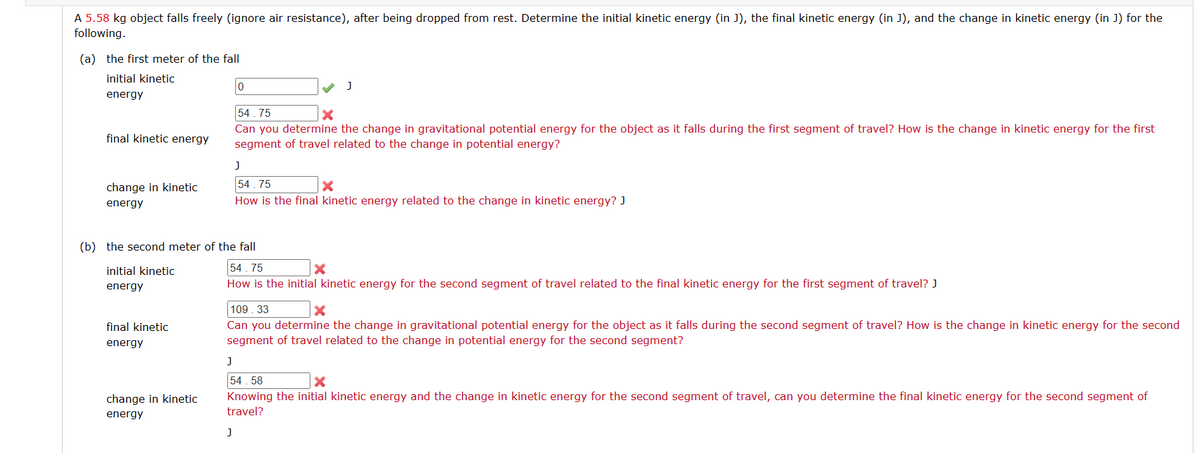A 5.58 kg object falls freely (ignore air resistance), after being dropped from rest. Determine the initial kinetic energy (in J), the final kinetic energy (in J), and the change in kinetic energy (in J) for the following. (a) the first meter of the fall initial kinetic energy final kinetic energy change in kinetic energy initial kinetic energy final kinetic energy change in kinetic energy 0 (b) the second meter of the fall 54.75 x How is the initial kinetic energy for the second segment of travel related to the final kinetic energy for the first segment of travel? J 54.75 x Can you determine the change in gravitational potential energy for the object as it falls during the first segment of travel? How is the change in kinetic energy for the first segment of travel related to the change in potential energy? J J 54.75 X How is the final kinetic energy related to the change in kinetic energy? J 109.33 Can you determine the change in gravitational potential energy for the object as it falls during the second segment of travel? How is the change in kinetic energy for the second segment of travel related to the change in potential energy for the second segment? 54.58 x Knowing the initial kinetic energy and the change in kinetic energy for the second segment of travel, can you determine the final kinetic energy for the second segment of travel? J
Kinematics
A machine is a device that accepts energy in some available form and utilizes it to do a type of work. Energy, work, or power has to be transferred from one mechanical part to another to run a machine. While the transfer of energy between two machine parts, those two parts experience a relative motion with each other. Studying such relative motions is termed kinematics.
Kinetic Energy and Work-Energy Theorem
In physics, work is the product of the net force in direction of the displacement and the magnitude of this displacement or it can also be defined as the energy transfer of an object when it is moved for a distance due to the forces acting on it in the direction of displacement and perpendicular to the displacement which is called the normal force. Energy is the capacity of any object doing work. The SI unit of work is joule and energy is Joule. This principle follows the second law of Newton's law of motion where the net force causes the acceleration of an object. The force of gravity which is downward force and the normal force acting on an object which is perpendicular to the object are equal in magnitude but opposite to the direction, so while determining the net force, these two components cancel out. The net force is the horizontal component of the force and in our explanation, we consider everything as frictionless surface since friction should also be calculated while called the work-energy component of the object. The two most basics of energy classification are potential energy and kinetic energy. There are various kinds of kinetic energy like chemical, mechanical, thermal, nuclear, electrical, radiant energy, and so on. The work is done when there is a change in energy and it mainly depends on the application of force and movement of the object. Let us say how much work is needed to lift a 5kg ball 5m high. Work is mathematically represented as Force ×Displacement. So it will be 5kg times the gravitational constant on earth and the distance moved by the object. Wnet=Fnet times Displacement.

Trending now
This is a popular solution!
Step by step
Solved in 4 steps with 4 images




